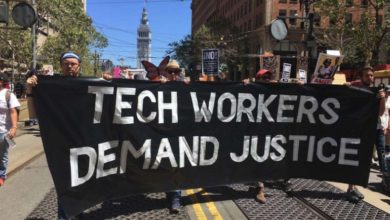The 3.3 million people who filed for unemployment benefits as the Coronavirus shutdown began have been joined by an additional 6.6 million newly-unemployed workers in the latest weekly Labor Department statistics. And there are likely millions more who did not file with the Labor Department because websites and call centers were inaccessible or they are unjustly denied benefits due to immigration status. The Federal Reserve Bank of St. Louis has estimated that 47 million people could lose jobs in the next quarter as a result of the pandemic. The resulting 32.1% unemployment rate would far exceed the 24.9% experienced in the Great Depression.
The deadly impact of the pandemic is not surprising, given that tens of millions of people, many of them barely making ends meet, have no access to health care and medical insurance is often linked to employment. Add mass layoffs as businesses grind to a halt, and a purely medical threat becomes a full-blown crisis exposing profound structural flaws in a profit-driven system. The pandemic makes it obvious that workers keep society running, not the bosses.
Working class people are not just passively waiting for corporate bosses and politicians to address the crisis. Fears over how to pay bills without a paycheck, combined with anger over a lack of protective equipment, is driving a wave of courageous actions across the country. Several companies have been hit with strikes, including McDonald’s, Food Lion, Walmart, Amazon, Whole Foods, Instacart and Perdue. Sanitation workers in Pittsburgh have gone on strike to protest unsafe working conditions.
This initial wave hints at the power that could be unleashed in the form of work stoppages, rent strikes, and other responses, and it has nervous politicians scrambling to make concessions. While it would be naïve to suggest that politicians have true concern for workers’ well-being, it is important to understand that without these and other militant actions around the country — and the real likelihood that this is just the beginning — they would not have felt the pressure to respond.
Furthermore, ideological opposition to capitalism itself and support for socialism has become increasingly pronounced in recent years, especially among youth. Economic inequality has become a central part of political discourse in the United States. The ruling class is well aware of these phenomena as well.
Gains from struggle
The Coronavirus Aid, Relief, and Economic Security Act (CARES) signed into law on March 27 allocates an estimated $260 billion to address surging unemployment as part of the stimulus package of at minimum $2 trillion, much of it going to Wall Street and large corporations. The law creates three new federally funded unemployment insurance programs: Pandemic Unemployment Compensation, Pandemic Emergency Unemployment Compensation, and Pandemic Unemployment Assistance.
These new programs should have received more funding, but they do expand eligibility and increase payment amounts. Self-employed workers and those who have exhausted their limit of benefits are now covered, in addition to workers who would usually be eligible for benefits. Other newly eligible groups include people seeking part-time work, those who would not have had a sufficient employment history, and people who are quarantined or whose workplace is closed due to COVID-19.
Workers will receive an additional $600 per week above the previously allotted payment.
The new benefits are administrated by state government offices, many of them under-funded and ill-equipped to deal with the surge in demand. Workers who experience problems should not give up. People should first check the Department of Labor website to confirm eligibility.
Then contact your state unemployment office by phone or online.
Document everything: Date and time of call, length of conversation, who you spoke to, screen shots of pages on the web site. And if your claim is denied, legal aid advocates may be able to offer assistance.
Without pressure from the working class, capitalists and the politicians who serve them will concede nothing. This pandemic has exposed how broken the system is, and how deadly the consequences are. We stand in solidarity with the striking workers and the unemployed in these and future crucial struggles.





